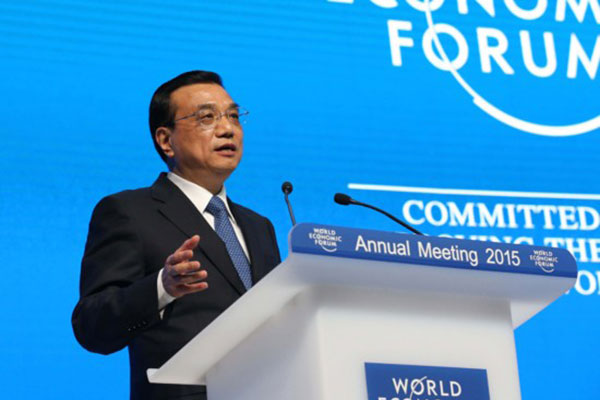
Premier Li Keqiang delivers a keynote speech at the World Economic Forum (WEF) annual meeting in Davos, Switzerland on Jan 21.[Photo/Xinhua]
Premier Li Keqiang unveiled policies to a global audience that have been beneficial to the Chinese people during a three-day visit to Davos last week.
The Premier returned to Beijing on Jan 23 after attending the World Economic Forum (WEF) in the Swiss town nestled in the Alps.
The purpose of the trip was, in part, to highlight China’s new mode of development, but he also put the spotlight on policies that the government has carried through or is implementing.
Motivating the market through reforms
“In the face of downward pressure, we did not resort to a strong stimulus; instead, we vigorously pursued reforms, and the government, in fact, led these reforms by streamlining administration and delegating power. This has motivated both the market and the business sector,” Premier Li said in a keynote speech at the forum on Jan 21.
The last year has seen these words put into action. He chaired 40 executive meetings of the State Council in 2014 and “streamlining administration and delegating power” topped the agenda for 21 of those meetings.
He once told an executive meeting that the government must follow people’s wishes when governing the country and government employees must always prioritize the public need.
“Did you have any idea, before such reforms were carried out, how many departments people had to visit and how many approvals they had to get in order to start a business?” he asked, noting that budding entrepreneurs might have lost their motivation in the tangle of red tape.
As the Premier reaffirmed at the forum, getting administrative approvals is no longer a time-wasting or energy-consuming exercise for the public.
Equal opportunity
Innovation was a major topic at the forum that examines ways to enhance global economic activity.
“Mass entrepreneurship and innovation serves to unleash people’s ingenuity and power. It will result in greater demand and consumption, greater social wealth, and boost public welfare. More importantly, it will bring opportunity for many and give people the chance to realize life’s full potential. It will also bring about greater social mobility, equity and justice,” the Premier said in the speech.
“China has 1.3 billion people, a 900-million workforce, and over 70 million enterprises and businesses run by the self-employed. Our people are hardworking and talented. If we could activate every cell in society, the economy of China as a whole will brim with more vigor and gather power for growth,” he added.
Employment for young people
People rely on employment to make a living and to contribute to society. Making sure this goal is realized for every young person is essential. The Premier said in his first government work report in March last year that the government would add 10 million more urban jobs.
“Over 13 million new jobs were created in cities, with both registered and surveyed unemployment rates lower than the previous year. That is, we achieved growth in employment despite the economic slowdown,” Li announced at the forum.
A program was launched by the State Council in May to help more graduates find employment or start their own businesses.
Li noted in several executive meetings that more must be done to protect workers’ basic rights and interests according to the law as well as to enhance social security.
The Premier also offered an outline of the government’s work on ensuring employment in 2015 in his keynote speech.
“We need to adopt more innovative macro-regulation policies and develop a more vigorous micro-economy. We also need to promote a more balanced development of industries, between rural and urban areas and among regions and ensure a relatively high employment rate, especially sufficient employment for young people. And we need to optimize income distribution and raise living standards,” he said.
Expanding goods and services
To transform the traditional engine of growth, the Premier said, the government will focus on increasing the supply of public goods and services.
He pointed out that while China has made remarkable economic progress, an inadequate supply of public goods and services remains a weak link in development.
“This means a massive space for increasing public goods and services,” he said, adding that it is the government’s responsibility to deliver such public goods and services.
“They are also important ways to boost domestic demand,” Li added.
The Premier suggested this approach at the last executive meeting of the State Council in 2014.
Market-oriented reform of government procurement procedures opens the door for more public goods and services, he said.
Key projects
“This year, we have identified some key areas for investment, including building railways in central and western provinces, constructing water conservancy projects, rebuilding rundown urban areas and old houses in cities and villages, and preventing and controlling pollution,” the Premier said in the speech.
The government will step up efforts in renovating rundown city areas, he said when meeting with members of the International Business Council at the forum.
“There are still about 100 million people living in urban shanty areas, and many of them in old houses. We will increase investment in this field and meet basic housing needs,” he said when responding to a question from Carlos Ghosn, chairman and CEO of Renault — Nissan Alliance.
“People’s livelihood should be the priority of the government’s work. Government employees must always put the needs of our people first,” he said at a press conference after the closing meeting of the second annual session of China’s 12th National People’s Congress (NPC) in March 2014.
It is a message he has taken to the global stage.
